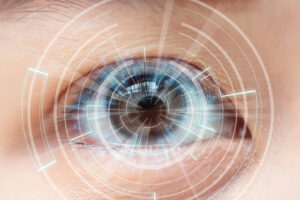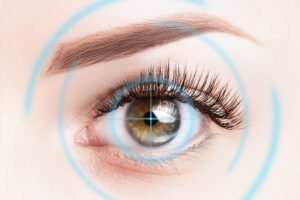
Analysis Shows Higher Long-Term Risk of Infections for Contact Lens Wearers (WebMD Health News)
By Salynn Boyles
The widely held belief that wearing contact lenses is safer than having laser surgery for vision correction is being challenged.
A leading eye doctor says contact lens users are actually more likely to develop complications that lead to vision loss over time than patients who have LASIK surgery.
Based on their review of several large studies, ophthalmologist William Mathers, MD, and colleagues concluded that daily contact lens wearers have about a one in 100 chance of developing a serious lens-related eye infection over 30 years of use, and a one in 2,000 chance of suffering significant vision loss as a result.
The researchers calculated the risk of significant vision loss due to LASIK surgery to be closer to one in 10,000 cases. They reported their findings in a letter published this month in the journal Archives of Ophthalmology.
“One shouldn’t just assume that contacts are safer,” Mathers tells WebMD. “This may have been true at one time, but for the average person this is certainly not the case anymore.”
Direct Comparisons Difficult
Between 20 and 25 million people in the U.S. wear contact lenses; about a million Americans have laser surgery to correct vision problems each year.
Mathers is an eye surgeon who specializes in treating vision-threatening eye infections at the Oregon Health & Science University’s Casey Eye Institute in Portland.
“Several times a year, I have patients who lose eyes from complications because they’ve been wearing contacts and they’ve gotten an infection,” he says. “By this I mean their eye has to be physically removed from their bodies.”
Direct comparisons of the risks vs. benefits of contacts and laser surgery have been difficult because surgical complications are immediate and the risks associated with contact lenses accumulate over many years.
The risks associated with long-term use of contact lenses are greater when lenses are used improperly, but they remain even when wearers do everything right, Mathers says.
“Almost everyone who wears contact lenses violates some principle of proper use at some point,” he says. “Either they don’t wash their hands before putting them in or they use tap water [fusion_builder_container hundred_percent=”yes” overflow=”visible”][fusion_builder_row][fusion_builder_column type=”1_1″ background_position=”left top” background_color=”” border_size=”” border_color=”” border_style=”solid” spacing=”yes” background_image=”” background_repeat=”no-repeat” padding=”” margin_top=”0px” margin_bottom=”0px” class=”” id=”” animation_type=”” animation_speed=”0.3″ animation_direction=”left” hide_on_mobile=”no” center_content=”no” min_height=”none”][to store the lenses]. But infections can occur even when this doesn’t happen.”
Los Angeles ophthalmologist Jim Salz, MD, tells WebMD that sleeping in contacts dramatically increases the risk of infection. Salz is a spokesman for the American Academy of Ophthalmology.
“Out of 10,000 daily contact lens wearers, about one will develop a serious infection over the course of a year,” he says, adding that risk increases to one in 1,000 for wearers who sleep in their contacts.
“We advise patients to never sleep in contacts, even if the contacts are approved for this purpose,” he says.
Customized Surgery
Salz has been performing LASIK surgeries for the past 15 years. He says better lasers and better training have reduced the incidence of nighttime vision problems and other complications that were not uncommon years ago.
One big advance, he says, was the introduction of wavefront LASIK several years ago, which allows eye surgeons to customize the procedure for each eye.
A professor of ophthalmology at the University of Southern California, Salz says the risks of wearing contact lenses and having laser surgery are probably similar.
“In most cases the decision really comes down to patient preference,” he says.
Mathers acknowledges that his risk estimates are “approximate and subject to change.”
He adds that advances in both laser surgery and contact lens technology should make both approaches to vision correction even safer in years to come.[/fusion_builder_column][/fusion_builder_row][/fusion_builder_container] One of our clinics is the Atlanta LASIK Surgery Center – contact for more information.
Contact Us
If you have more questions about LASIK procedures, get in touch with us.
Related Blogs

Timing is Everything: When to Consider LASIK After Nursing for Optimal Results
Timing is everything when considering LASIK eye surgery after nursing, and understanding the optimal period for this procedure is vital for both mother and baby.

Cataract Surgery: Restoring Clarity and Confidence
Cataract surgery is a transformative procedure that offers a new lease on clear vision and renewed confidence. As cataracts cloud the eye’s lens, causing blurred

Intralase LASIK Explained: What to Expect Before, During, and After the Procedure
Intralase LASIK is a cutting-edge procedure that offers a safe, effective, and precise way to enhance vision compared to traditional LASIK methods. Understanding what to
